|
|
|
Sort Order |
|
|
|
Items / Page
|
|
|
|
|
|
|
| Srl | Item |
| 1 |
ID:
171330
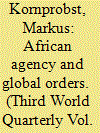

|
|
|
|
|
| Summary/Abstract |
How much agency do African states have to shape global orders? This study puts the global nuclear order under scrutiny to answer this question. It amounts to a demanding case. Arms control is something that global great powers take very seriously, and there is no weapons category that they take more seriously than nuclear weapons. My findings provide a nuanced picture. Although often outflanked and frustrated by nuclear weapon states, the nuclear order would look different without African actors exerting their agency. They successfully shaped background and foreground institutions constituting the global nuclear order by building advocacies for new institutions upon already existing ones, reaching out to state and non-state actors outside of Africa, and channelling communication through African states with authority in global fora. This study makes three contributions: First, it underlines the key finding of recent literature on African agency that African actors are more to be reckoned with than often assumed. Second, it provides novel evidence about the diplomatic mechanisms through which they come to make a difference. Third, it adds to our grasp of the constitution of global orders as well as the processes through which they come to be made, re-made and unmade more generally.
|
|
|
|
|
|
|
|
|
|
|
|
|
|
|
|
| 2 |
ID:
171329
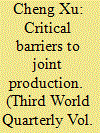

|
|
|
|
|
| Summary/Abstract |
In understanding how groups overcome collective action problems of mass mobilisation in civil wars, a joint-production explanation was put forth in the civil war literature. According to this explanation, collective action can be successful when leaders at the centre tie the public good – violence towards the overall goal of the movement – inextricably to private interests of actors at the peripheral levels of the conflict. It is through this logic of joint production that we can understand the failures of the Islamic insurgencies in Southern Philippines and the spiralling levels of violence. Where other movements cohered under a common identity, the Islamist insurgency in Southern Philippines saw high degrees of fragmentation. In this paper, I argue that cleavages of regionalism created by colonial disruptions of land and social relations became a critical barrier for insurgent joint production. Furthermore, interactions between these identities and the state can pose further collective action problems. In Southern Philippines, insurgent leaders are unable to cut across these cleavages, resulting in increasingly fragmented movements and protracted conflict. Therefore, I argue that a joint-production approach to understanding civil wars can be especially promising when culturally and historically situated to explain why collective action often fails in civil war.
|
|
|
|
|
|
|
|
|
|
|
|
|
|
|
|
| 3 |
ID:
171328
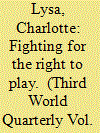

|
|
|
|
|
| Summary/Abstract |
This paper seeks to contribute to the scholarship on women and social change in Saudi Arabia through the case of female football players in Riyadh. Officially, there has been no women’s football in the kingdom, but beneath the surface women have been playing for more than a decade. The women are actively promoting and engaging in change and women’s opportunities to practise sport by building organisations, creating awareness, and negotiating norms and regulations. They are not in opposition to the regime, but supportive of reforms in favour of increased rights for women, while seeing conservative elements in the society as their opponents and the royal family as their allies. They are thus engaging in what O’Brian and Li termed ‘rightful resistance’, by deploying the language of the rulers to express their perspectives and aims, and are engaged in a three-party game with the rulers and conservatives, where divisions within the state and elite allies matter greatly.
|
|
|
|
|
|
|
|
|
|
|
|
|
|
|
|
| 4 |
ID:
171325


|
|
|
|
|
| Summary/Abstract |
Based on qualitative research conducted in three regions of Nicaragua, this paper examines the contribution of the communitarian approach to the new rurality in understanding the orientation and tensions within the peasant cooperative movement. The thematic analysis of 30 semi-structured interviews carried out with members of grassroots cooperatives reveals two main categories of motivation for engagement within the cooperative movement. A first set of motivations shows the will to transform the productive structures through small producer organisations to better adapt to the challenges imposed by global economic integration. A second set of motivations highlights broader socio-political objectives that seem to crystallise around the desire to build long-term alternatives to the exclusionary process of neoliberal globalisation. I explore these motivations in light of the distinction between reformist and communitarian approaches to the new rurality. I outline that the articulation of these two approaches, and more particularly the contribution of the communitarian approach, makes it possible to better understand the tensions within the cooperative movement in regard to socio-economic challenges. On this basis I call for a greater consideration of the communitarian dimensions of the new rurality to better define the role of the state, public policies and non-governmental organisations in supporting these phenomena.
|
|
|
|
|
|
|
|
|
|
|
|
|
|
|
|
| 5 |
ID:
171322


|
|
|
|
|
| Summary/Abstract |
Conflicts between sedentary farmers and nomadic pastoralists (herders) are a common phenomenon in Africa. In recent scholarship, environmental change, structural violence and capital flows to agro-pastoral communities are identified as the core conflict drivers. Although scholars differ on the exact causal pathways, most arguments ultimately centre around competition over access to water and land. Yet there is a lot more to learn about the ecology of these conflicts, especially people’s perception of pastoral nomads and its implication for conflict resolution. The tendency among researchers is to explore the conflict as if it comprises only objective realities devoid of subjective beliefs. Yet my research shows that popular representations of Fulani herders in Nigeria today reflect ancient stereotypes of nomadic peoples. By ignoring this subjective dimension of the conflict, we limit our understanding of its causes and the reason(s) behind its protraction, and, by extension, are blinded to the need for prejudice reduction. This paper argues that the perception of pastoral nomads as savages is a factor in the conflict because it shapes people’s relationship with, and reception of, Fulani herders. Hence, it must be grasped, probed and included in the visioning of conflict resolution.
|
|
|
|
|
|
|
|
|
|
|
|
|
|
|
|
| 6 |
ID:
171324
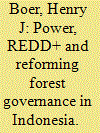

|
|
|
|
|
| Summary/Abstract |
This paper analyses the various power relations that shape forest policy and governance reform in Indonesia. It applies Foucault’s theories on power to several key initiatives introduced as part of REDD+ (Reducing Emissions from Deforestation and Forest Degradation). By analysing both the operation and the effects of power relations the paper accounts for how competing actors influence major policy change, and the impact different policies have on governing multiple forest users. Sovereign and disciplinary power underpins government attempts to implement new regulatory, planning and enforcement functions across the forest estate. Policy instruments such as the concession moratorium create securitised territorial zones that enable sustainable forest practices to operate. By contrast, forest management units operate through inclusive strategies that discipline forest users into responsible managers, whilst enforcement excludes those who contravene the law. Productive power and resistance explain efforts by government and non-government actors to progress or limit REDD+. Productive power operates through the multiple activities that generate new knowledge on incentivising carbon, and by engaging new subjects in carbon projects. Community resistance draws on discourses and localised subjectivities focussed on forest dependency and rights, whereas industry networks have been adept at positioning REDD+ as a threat to national development.
|
|
|
|
|
|
|
|
|
|
|
|
|
|
|
|
| 7 |
ID:
171326


|
|
|
|
|
| Summary/Abstract |
This article explores the relations to Africa and African decolonisation of three key figures in Brazilian critical geographies and development studies, Manuel Correia de Andrade (1922–2007), Josué de Castro (1908–1973) and Milton Santos (1926–2001). Based on an analysis of their works and unpublished archives, I argue the radical Third World perspectives these intellectuals expressed anticipated later critiques of development as a neocolonial device. Drawing upon current literature on decolonisation, international conferencing and anti-racist solidarity networks, I discuss these matters in relation to these authors’ interest in cultural diversity and internal colonialism. Crucially, they developed this sensitivity in the Brazilian Northeast, a region especially shaped by Afro–Brazilian and Indigenous cultural legacies. While supporting anti-imperialist nationalisms in the Third World, these Brazilian scholars fostered multilingual, internationalist and cosmopolitan activism and scholarship. This is revealed by the study of the transnational networks they developed during exile and the various persecutions that many of them suffered after the 1964 military coup. Finally, I argue these works can substantiate recent claims to ‘decolonise’ geography and development studies, on the condition that these fields of study take seriously their anti-imperial traditions and their ‘voices from the South’.
|
|
|
|
|
|
|
|
|
|
|
|
|
|
|
|
| 8 |
ID:
171323
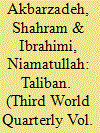

|
|
|
|
|
| Summary/Abstract |
Iran has pursued a highly contradictory policy towards Afghanistan. On the one hand, it became a significant beneficiary of the overthrow of the Taliban regime by the US-led military intervention in 2001 in Afghanistan. The new Afghan government established cordial ties with Iran, allowing it to expand its political, economic and cultural influence in the country. Yet Iran has also provided significant support to the Taliban in its campaign to violently upend the political, social and economic processes in the country. This article examines the underlying domestic and regional security dynamics that contribute to this contradictory behaviour. It offers an assessment of how tensions between the United States and the Islamic Republic, as well as Tehran’s growing threat perception following the rise of the Islamic State – Khorasan in 2014, impact on Iran’s policy towards the Taliban. The paper argues that Tehran views the Taliban as an instrument to disrupt the influence of other actors in Afghanistan. The instrumentalisation of the Taliban, however, is likely to be counterproductive for Iranian security in the long run as it contributes to Afghanistan’s instability and insecurity and undermines Iran’s own long-term interests.
|
|
|
|
|
|
|
|
|
|
|
|
|
|
|
|
| 9 |
ID:
171327


|
|
|
|
|
| Summary/Abstract |
The tremendous expansion of the Chinese economy since the turn of the century, especially in terms of its external dynamics, is of world-scale significance. It seems to justify the quest for appropriate conceptions of China’s systemic impact on late development worldwide. A large number of scholarly studies have coalesced to analyse two crucial aspects of the impact, namely: impact on the performance of industrialisation and the condition of labour in the developing world. This paper seeks to critically appraise and reinterpret the existing studies. The appraisal is not so much a critique but rather an attempt to appropriately position the studies in the systemic context. It is submitted that the existing studies’ focus on market competition, as the main form through which China’s impact manifests, needs to be complemented and underpinned by the more fundamental consideration of productive investment. In the direction of constructing a systemic conception, it is further submitted that the China impact can potentially serve as a countervailing force against the prevailing dynamics of the world economy under neoliberal globalisation – ie the rising predominance of speculative finance that tends to crowd out productive investment, thereby hampering industrialisation and worsening labour conditions in the developing world.
|
|
|
|
|
|
|
|
|
|
|
|
|
|
|
|
|
|
|
|
|